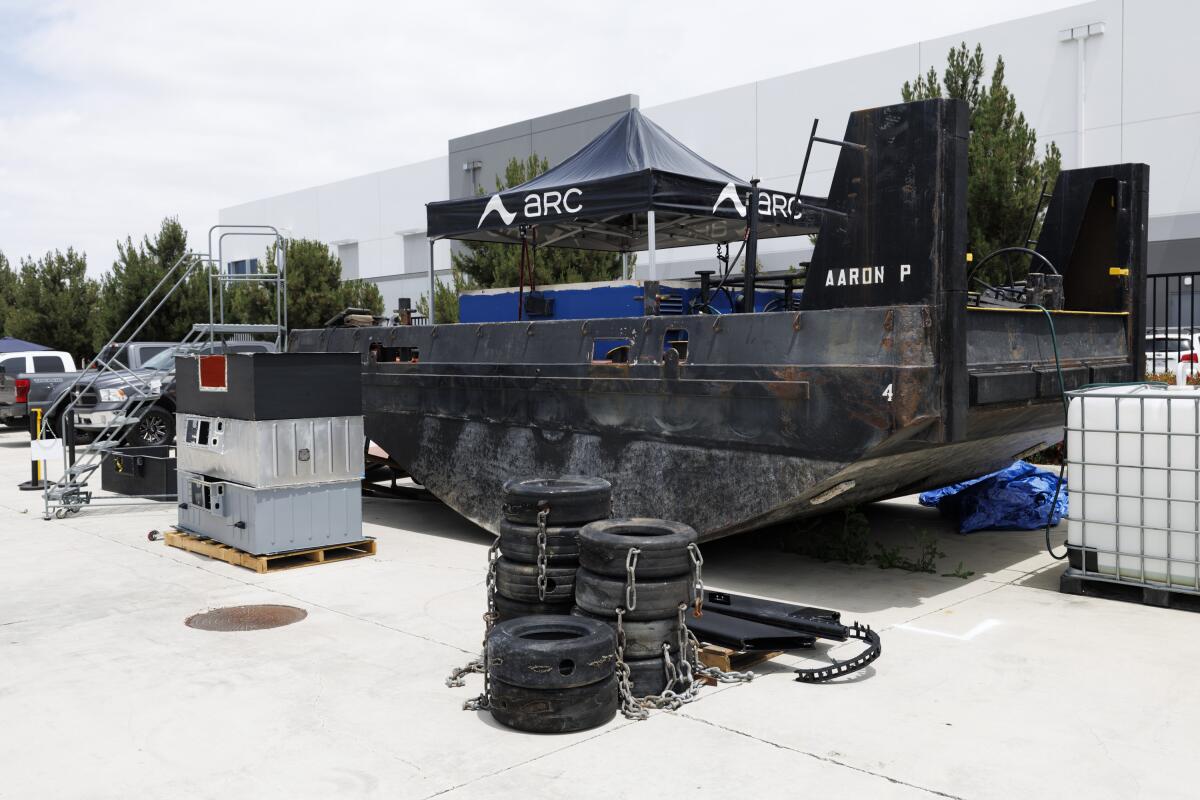Business
Lithium Scarcity Pushes Carmakers Into the Mining Business

Eager to avoid falling further behind Tesla and Chinese car companies, many Western auto executives are bypassing traditional suppliers and committing billions of dollars on deals with lithium mining companies.
They are showing up in hard hats and steel-toed boots to scope out mines in places like Chile, Argentina, Quebec and Nevada to secure supplies of a metal that could make or break their companies as they move from gasoline to battery power.
Without lithium, U.S. and European carmakers won’t be able to build batteries for the electric pickup trucks, sport utility vehicles and sedans they need to remain competitive. And assembly lines they are ramping up in places like Michigan, Tennessee and Saxony, Germany, will grind to a halt.
Established mining companies don’t have enough lithium to supply the industry as electric vehicle sales soar. General Motors plans for all its car sales to be electric by 2035. In the first quarter of 2023, sales of battery-powered cars, pickups and sport utility vehicles in the United States rose 45 percent from a year earlier, according to Kelley Blue Book.
So car companies are scrambling to lock up exclusive access to smaller mines before others swoop in. But the strategy exposes them to the risky, boom-and-bust business of mining, sometimes in politically unstable countries with weak environmental protections. If they bet incorrectly, automakers could end up paying far more for lithium than it might sell for in a few years.
Auto executives said they had no choice because there weren’t sufficient reliable supplies of lithium and other battery materials, like nickel and cobalt, for the millions of electric vehicles the world needs.
In the past, automakers let battery suppliers buy lithium and other raw material on their own. But lithium shortages have forced carmakers, which have deeper pockets, to directly acquire the essential metal and have it sent to battery factories, some owned by suppliers and others owned partly or fully by the automakers. Batteries rely on lightweight lithium ions to conduct energy.
“We quickly realized there wasn’t an established value chain that would support our ambitions for the next 10 years,” said Sham Kunjur, who oversees General Motors’ program to secure battery materials.
The automaker last year struck a supply deal with Livent, a lithium company in Philadelphia, for material from South American mines. And in January, G.M. agreed to invest $650 million in Lithium Americas, a company based in Vancouver, British Columbia, to develop the Thacker Pass mine in Nevada. The company beat out 50 bidders, including battery and component makers, for that stake, said Mr. Kunjur and Lithium Americas executives.
Ford Motor has made lithium deals with SQM, a Chilean supplier; Albemarle, based in Charlotte, N.C.; and Nemaska Lithium of Quebec.
“These are some of the largest lithium producers in the world with the best quality,” Lisa Drake, vice president for electric vehicle industrialization at Ford, told investors in May.
The deals that automakers are striking with mining companies and raw material processors hark back to the beginnings of the industry, when Ford set up rubber plantations in Brazil to secure material for tires.
“It almost seems like 100 years later, with this new revolution, we are back to that stage,” Mr. Kunjur said.
Establishing a supply chain for lithium will be expensive: $51 billion, according to Benchmark Mineral Intelligence, a consulting firm. To benefit from U.S. subsidies, battery raw materials must be mined and processed in North America or by trade allies.
But intense competition for the metal has helped inflate lithium prices to unsustainable levels, some executives said.
“Since the start of ’22 the price of lithium has gone up so quickly and there was so much hype in the system, there were a lot of really bad deals that one could do,” said R.J. Scaringe, chief executive of Rivian, an electric vehicle company in Irvine, Calif.
Dozens of companies are developing mines, and there may eventually be more than enough lithium to meet everybody’s needs. Global production could surge sooner than expected, leading to a collapse in the price of lithium, something that has happened in the recent past. That would leave automakers paying a lot more for the metal than it was worth.
Auto executives are taking no chances, fearing that if they go even a few years without sufficient lithium their companies will never catch up.
Their fears have merit. In places where electric vehicle sales have grown the fastest, established automakers have lost a lot of ground. In China, where almost one-third of new cars are electric, Volkswagen, G.M. and Ford have lost market share to domestic producers like BYD, which manufacturers its own batteries. And Tesla, which has built a supply chain for lithium and other raw materials over years, has steadily gained market share in China, Europe and the United States. It is now the second-largest seller of all new cars in California after Toyota.
Chinese companies often have an edge over U.S. and European car companies because they are state owned or state supported, and, as a result, can take more risks in mining, which often encounters local opposition, nationalization by populist governments or technical difficulties.
In June, the Chinese battery maker CATL completed an agreement with Bolivia to invest $1.4 billion in two lithium projects. Few Western companies have shown sustained interest in the country, known for its political instability.
With a few exceptions, Western carmakers have avoided buying stakes in lithium mines. Instead, they are negotiating agreements in which they promise to buy a certain amount of lithium within a price range.
Often the deals give carmakers preferential access, crowding out rivals. Tesla has a deal with Piedmont Lithium, which is near Charlotte, that ensures the carmaker a large portion of the output from a mine in Quebec.
Lithium is abundant but not always easy to extract.
Many countries with big reserves, like Bolivia, Chile and Argentina, have nationalized natural resources or have stringent currency exchange controls that can limit the ability of foreign investors to withdraw money from the country. Even in Canada and the United States, it can take years to establish mines.
“Lithium is going to be tough to get and to fully electrify here in the U.S.,” said Eric Norris, president of the Lithium global business unit at Albemarle, the leading American lithium miner.
As a result, auto executives and consultants are fanning out to mines around the world, most of which have not begun producing.
“There’s a bit of desperation,,” said Amanda Hall, chief executive of Summit Nanotech, a Canadian start-up working on technology to hasten extraction of lithium from saline groundwater. Auto executives, she said, are “trying to get ahead of the problem.”
Yet, in their hurry, car companies are making deals with small mines that may not live up to expectations. “There are a lot of examples of problems that come up,” said Shay Natarajan, a partner at Mobility Impact Partners, a private equity fund focused on investing in sustainable transportation. Lithium prices could eventually collapse from overproduction, she said.
The miners appear to be the big winners. Their deals with the car companies typically assure them fat profits and make it easier for them to borrow money or sell shares.
Rio Tinto, one of the world’s largest mining companies, recently reached a preliminary agreement to supply lithium to Ford from a mine it was developing in Argentina.
Ford was one of several car companies that expressed interest, said Marnie Finlayson, managing director of Rio Tinto’s battery minerals business. Rio Tinto takes car company representatives through a checklist, she said, that covers mining methods, relations with local communities and environmental impact “to get everyone comfortable.”
“Because if we can’t do that, then the supply is not going to be unlocked, and we’re not going to solve this global challenge together,” Ms. Finlayson said, referring to climate change.
Until a few years ago, the price of lithium was so low mining it was hardly profitable. But now with the growing popularity of electric vehicles, there are dozens of proposed mines. Most are in early development stages and will take years to begin production.
Until 2021, “there was either no capital or very short-term capital,” said Ana Cabral-Gardner, co-chief executive of Sigma Lithium, a Vancouver-based company that is producing lithium in Brazil. “No one was looking at a five-year horizon and a 10-year horizon.”
Auto companies are playing an important role in helping mines get up and running, said Dirk Harbecke, chief executive of Rock Tech Lithium, which is developing a mine in Ontario and a processing plant in eastern Germany that will supply Mercedes-Benz.
“I do not think that this is a risky strategy,” Mr. Harbecke said. “I think it’s a necessary strategy.”

Business
How Trump China Tariffs Hit One Shipment of T-Shirts

This is a customs form that companies must file to import goods into the United States. In recent days, these forms have become living documents that show how President Trump’s tariffs are squeezing businesses.
In this example, Leslie Jordan Inc., a company that sells activewear for special events, imported a shipment of women’s T-shirts from China at the end of April. That was after Mr. Trump aggressively escalated levies on Chinese imports, but before officials from both countries agreed on a temporary reprieve — an example of how companies have struggled to plan for their purchases as tariff levels continually shift.
The shipment was valued at $18,639, but this company paid $34,389 in tariffs — almost twice the value of the goods themselves. The import tax on this one shipment added up to nearly 185 percent.
Often Mr. Trump’s new tariffs are layered on top of existing ones. In this case, the T-shirts were subject to a base tariff of 32 percent based on the value of the import. Many goods typically have a very low base tariff, but garments and other textile goods are subject to some of the highest tariffs.
A number of goods from China are also subject to special tariffs to combat alleged unfair trade practices. These tariffs — known as Section 301 duties — were introduced during Mr. Trump’s first term and later expanded by former President Joseph R. Biden Jr. In this case, they resulted in a 7.5 percent additional charge.
One of Mr. Trump’s first trade actions when he started his second term in January was to impose a tariff on China for enabling the flow of fentanyl into the United States. The tariff started at 10 percent but was then raised to 20 percent.
In early April, the administration introduced “reciprocal” tariffs. China’s rate started at 34 percent, then escalated to 84 percent before rising to 125 percent. (This tariff, in addition to the 20 percent “fentanyl” tariff, amounts to a 145 percent tariff on most goods.)
To import one shipment of T-shirts, the company had to pay four different tariffs. “It is impossible to plan and run a business this way,” said Leslie Jordan, the company’s owner.
On Monday, the reciprocal portion of tariffs on Chinese imports was suspended for 90 days as the United States and China negotiate new trade terms.
That means if this same shipment were to arrive today, it would face a total tariff rate of 69.5 percent — a very high level, but a fraction of what the company was forced to pay just a couple of weeks ago. This lower rate means Ms. Jordan would have paid $21,000 less in tariffs on this one shipment than she did before.
Ms. Jordan, who founded her company nearly 40 years ago, said the administration’s tariff policy had been the hardest challenge she had faced running the business. While some of the tariffs have been lifted, at least temporarily, the time it takes to place orders, get products manufactured and then have them loaded onto ships and transported across the Pacific would probably exceed the 90-day reprieve.
And given the drastic changes in U.S. trade policy, Ms. Jordan said, she has little ability to predict how much she may need to pay when her next order lands at American ports. “If we base it on today’s tariff,” she said, “who knows what it will be when the goods are produced and arrive?”
Business
This Southland boat company wants to electrify the Port of Los Angeles

An electric boat company with roots in Torrance is taking steps to bring battery-powered workboats and charging infrastructure to the Port of Los Angeles, where diesel-burning vessels emit tons of carbon dioxide.
Arc Boat Co., a Southern California startup that sells electric boats for recreational use, said it will open a research and development facility at the port in June.
The facility signals a move toward electrification at the nation’s busiest port and marks Arc’s expansion into the commercial sector.
Arc’s promise to deliver an electrified fleet of workboats comes five years ahead of a 2030 deadline set by the ports of Los Angeles and Long Beach to transition to zero-emission equipment.
The twin ports, situated on more than 10,000 acres on San Pedro Bay, rely on heavy-duty cranes, tugboats and trucks to move cargo. Replacing the roughly 2,000 tugboats in the U.S. with electric alternatives could prevent more than 1.6 million cars’ worth of greenhouse gas emissions annually, according to Arc.
“Across the entire marine industry, going electric makes an incredible amount of sense,” Arc co-founder and Chief Executive Mitch Lee said in an interview. “These boats don’t have fumes, and you can cut your operating costs substantially.”
Electric boats require minimal maintenance and zero fuel, an appealing combination for commercial operators who want to save money and consumers looking to enjoy the water, Lee said. Arc’s boats are also quieter and easier to maneuver than traditional boats, he said.
Co-founders Ryan Cook, left, and Mitch Lee sit on an electric boat at Arc Boat Co. on May 12, 2025, in Torrance.
(Carlin Stiehl/Los Angeles Times)
The electrification of vehicles on the water could soon gain momentum, said Petros Ioannou, an engineering professor at USC who researches transportation technology.
“The main reason for going electric is really the environment,” Ioannou said. “The question is whether they are able to solve the technological and logistical problems” presented by electric boats, including power, range and charging limitations.
Despite the challenges of building a battery capable of propelling a boat, several companies including Navier and X Shore are producing and selling electric vessels. Arc’s business currently revolves around recreational boats for water sports, starting at $268,000.
In a partnership with Portland, Ore.-based shipyard Diversified Marine Inc., Arc plans to retrofit a 26-foot-long truckable tugboat with lithium-ion battery packs and a 600-horsepower drivetrain. The vessel will be the first zero-emission tug to support operations at the Port of Los Angeles, Arc said.
Tugboats are an essential tool at the ports of Los Angeles and Long Beach, where they guide larger vessels and move equipment such as barges and cranes.
“Tugs run short, repetitive missions requiring high torque, and start and end at the same home base,” Arc said in a statement announcing its retrofitting project. “Not only does that make them well-suited to going electric, but doing so drastically reduces operating expenses.”
Teaming up with Diversified Marine allows Arc to launch its new workboat in collaboration with several entities that do business at the port, Lee said.
“Diversified already knows how to tap into the port operations and get this vessel to work,” he said. “We’re modernizing their tugboat and deploying it into the Port of L.A., and we’re able to provide charging infrastructure as well.”

A tugboat is retrofitted with an electric motor at Arc Boat Co. on May 12, 2025, in Torrance.
(Carlin Stiehl/Los Angeles Times)
Switching from diesel-powered to electric workboats can save commercial operators roughly 50% on maintenance and fuel costs, Lee said, adding that Arc’s new research and development facility will provide the groundwork to make the switch possible.
The company did not disclose how much money it was putting into the research facility and accompanying charging network, but said it probably will require an investment of less than $10 million.
The facility will sit within a 35-acre research campus operated by the nonprofit AltaSea. It will support prototype development of electric workboats, on-water testing and fleet deployment, Arc said. The company builds its battery packs out of a separate facility in Los Angeles.
“Decarbonization at our ports is a critical step to achieving real, substantive climate progress,” AltaSea said in a statement. “Arc Boat’s new R&D facility and charging infrastructure will help make the Port of L.A. a global model for sustainable maritime operations.”
Launched in 2021 by former Boeing and SpaceX engineers, Arc has a mission to electrify everything on the water, Lee said. Before co-founding Arc with fellow Northwestern alum Ryan Cook, Lee grew up in the Bay Area and frequently boated with his family.
Arc has received more than $100 million in investment funds from California-based venture capital firms including Andreessen Horowitz and Lower Carbon Capital, among others. The startup employs 170 people, including experts with backgrounds at electric vehicle companies Rivian and Tesla.
The company did not disclose its annual revenue, but said demand for its boats is high. Two models are available to be delivered nationwide, including the Arc Sport, designed for wake surfing and water skiing; and the Arc One, a luxury cruiser.
Arc is the only electric boat company to build its own battery packs in-house, Lee said.
Although assembly is done in Los Angeles, President Trump’s steep tariffs on U.S. trade partners — including a 145% tax on goods imported from China — have still presented a challenge. The tariff on China has since been reduced to 30%.
“We are definitely impacted by tariffs and the electric vehicle market has heavy ties to Chinese supply chains,” Lee said. “We’re also ahead of the curve and far more vertically integrated than most companies.”
With ambitions to build electric boats capable of hauling cargo and traveling long distances, Arc will need to stay at the forefront of battery development, Ioannou from USC said. Producing its batteries domestically may give Arc an advantage as tariffs disrupt global trade.
“Whether this space will progress in a rapid way will very much depend on the battery technology and availability,” Ioannou said.
“When you go from gasoline to electric, there are certain benefits that you get, but a lot of headaches too,” he said.
Business
The Stock Market’s Boomerang Month Has Put Investors in a Bind

The stock market is now higher than before President Trump’s broad and steep tariffs sent share prices into a tailspin. The 10-year government bond yield is now largely in line with where it started the year. On Tuesday, a widely watched measure of inflation nudged lower.
Judging from a snapshot of today’s financial markets, it would be easy to conclude that very little had happened over the last four and a half months.
As the administration has dialed down its trade offensive, delaying the worst of the tariffs announced on April 2 and promoting a long list of trade deals in the works, stocks have risen and the unnerving volatility in the government bond market — which Mr. Trump noted when he first began pausing his tariffs — has subsided.
On Tuesday, the latest reading of the Consumer Price Index showed a slower pace of inflation in April than economists had predicted, despite widespread concerns that tariffs could have sped up price increases.
The S&P 500, which came close to hitting a bear market early last month, is now up slightly since the start of the year, after a 0.7 percent gain on Tuesday.
Still, investors remained cautious, and complain that the outlook remains uncertain, with little clarity on what the final level of tariffs will be.
That leaves them in a tricky position, with many saying they have little conviction as to where the economy is headed but they cannot afford to wait on the sidelines and miss out on the possibility that tariffs will be lowered further and stocks will rise.
In the meantime, investors are still trying to parse how the tariffs that remain in place — including 30 percent tariffs on many Chinese imports — are affecting consumer spending and corporate profits
John Kerschner, a portfolio manager at Janus Henderson, said signs of tariff-fueled inflation are not likely to show up in the economic data for months.
“The market will wait with bated breath for those readings to make a determination of where we actually stand on tariff induced rising prices. Thus, market uncertainty will likely remain elevated,” Mr. Kerschner said.
The Federal Reserve is also in a wait-and-see mode, unwilling to keep lowering interest rates before the inflationary effect of the new tariffs is known. That’s because lower interest rates stimulate the economy and could add a further tailwind to inflation.
Market bets on when the Fed will next lower interest rates have gradually been pushed further out. At the start of this year, investors were anticipating that the Fed would lower interest rates at its meeting last week. Now, investors expect the first rate cut of the year to arrive at the September meeting.
Ellen Zentner, chief economic strategist for Morgan Stanley Wealth Management said the lower than expected reading in the Consumer Price Index on Tuesday “doesn’t mean tariffs aren’t impacting the economy, it just means they aren’t showing up in the data yet.”
“Wait-and-see is still the name of the game, and until that changes, the Fed will remain on the sidelines,” she added.
The longer uncertainty prevails, the more it becomes its own economic force, separate from the tariffs. Uncertainty means businesses hold off on making investment decisions and consumers pull back from spending, slowing economic growth.
Beneath the surface, that concern is still evident in the markets.
The Russell 2000 index of smaller companies, which are more at risk from a downturn in the economy, has risen from its lows, but remains 14 percent lower than its peak in November. The S&P 500 is only 4 percent below its February high.
The lowest-rated corporate debt continues to show some signs of strain.
Then there is the dollar, which has sent the most pointed signal of concern about tariffs. The dollar index, which measures the currency against a basket of its peers, has fallen 6.9 percent so far this year.
That is the dollar’s biggest slide since the end of 2022, when the Fed pivoted from raising interest rates, which had strengthened the dollar, to holding them steady.
But even now, as tariffs have de-escalated, the dollar has regained ground.
“As far as markets are concerned, there’s now a belief that the worst of the trade war has passed, and that the trend is now towards de-escalation,” noted analysts at Deutsche Bank said in a recent research note. But they also warned, “The U.S. is not out of the woods yet.”
-

 Austin, TX4 days ago
Austin, TX4 days agoBest Austin Salads – 15 Food Places For Good Greens!
-

 Education1 week ago
Education1 week agoIn Alabama Commencement Speech, Trump Mixes In the Political
-

 Technology1 week ago
Technology1 week agoBe careful what you read about an Elden Ring movie
-

 Culture1 week ago
Culture1 week agoPulitzer Prizes 2025: A Guide to the Winning Books and Finalists
-

 Technology6 days ago
Technology6 days agoNetflix is removing Black Mirror: Bandersnatch
-

 Education1 week ago
Education1 week agoUniversity of Michigan President, Santa Ono, Set to Lead University of Florida
-

 World6 days ago
World6 days agoThe Take: Can India and Pakistan avoid a fourth war over Kashmir?
-

 News6 days ago
News6 days agoReincarnated by A.I., Arizona Man Forgives His Killer at Sentencing
















